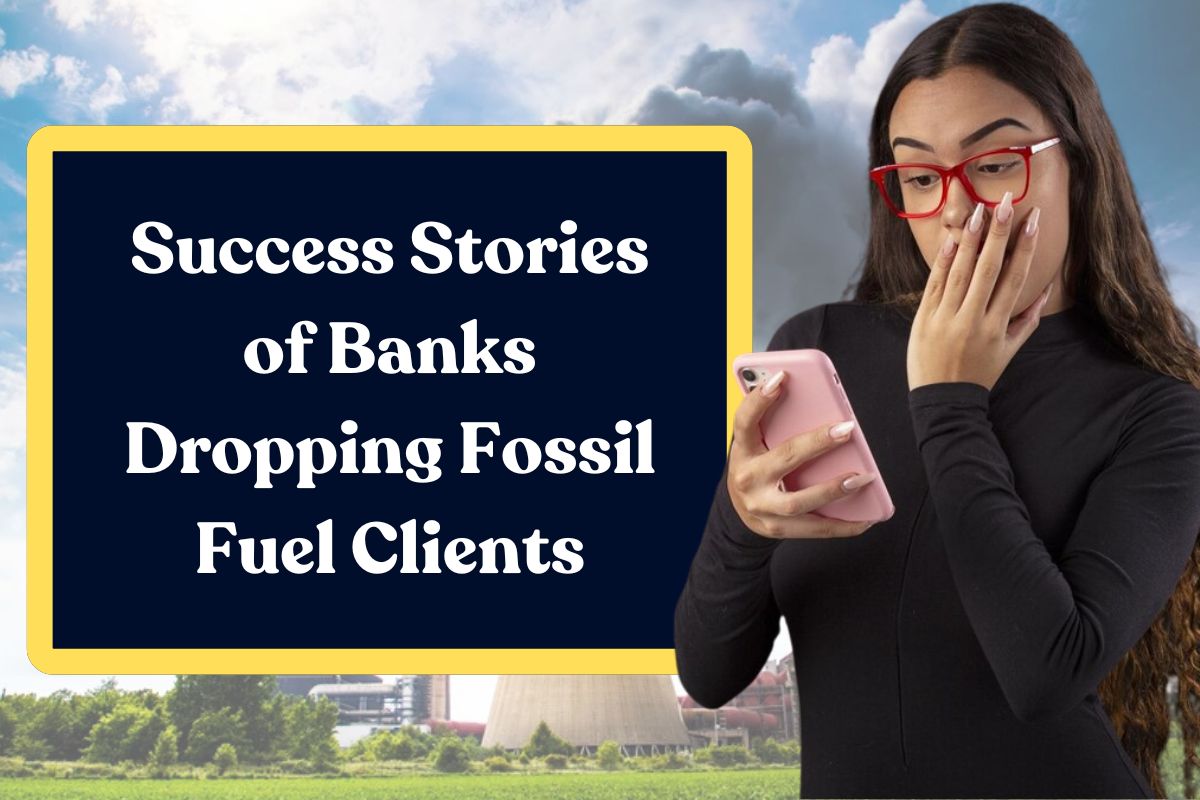We are seeing that the climate crisis is intensifying day by day and so is the public pressure on the banks to stop the fundings for fossil fuel. All over the world we are seeing that banks are actively working to change their investment strategies.

They are cutting their ties with coal, oil, and gas companies and redirecting the funds towards the more clean and sustainable investments. But what does this shift actually look like? And which banks are leading the way?
In this blog, we’ll explore real-life success stories of banks that have dropped fossil fuel clients, backed by accurate, publicly available data. These stories are not just about climate ethics, they’re about how financial institutions are shaping the future of the planet.

Why This Matters: Finance as a Climate Lever?
The fossil fuel projects rely heavily on the loans and the underwriting from the banks so they can operate and expand. Now, without the financial support, not only would they be able to build anything, it would become harder to even get permits from authorities. This means that it would become harder for companies to build pipelines, drill new wells, or dig up more coal.
As per the recent reports from International Energy Agency (IEA), there can be no new oil and gas fields if the world wants to meet its climate target. Banks pulling out is a powerful step in that direction.

Crédit Mutuel
It was the very first bank that completely walked away from fossil fuel investments. They will completely exit from the coal financing by 2020. The bank has committed that they would be coal free globally by the end of 2030.
Now they have acknowledged that this particular decision might come with certain short term financial losses, but they highlighted that their climate responsibility outweighs the profit.

This particular action and the stance have also inspired other European banks to reconsider their position. Crédit Mutuel bank had around $19 million in coal exposure in 2016, by 2020 they brought down that number to zero.
UBS
Understanding the need of the hour the Swiss banking giant UBS has also taken steps to significantly reduce their fossil fuel financing. They have recorded a staggering 73% drop. In 2016 their total exposure was $7.7 Billion, now they have brought it to $2.1 billion.

Apart from disinvestment they went one step ahead, they integrated climate risk directly into their operations. UBS is currently using advanced tools such as climate heat map that helps them in identifying the carbon intensity of their clients portfolios. This approach has now become standard for other banks who are working towards reducing the climate risk.
Barclays
In Feb 2024, we heard a huge policy shift from Barclays. This particular policy change talked about stopping funding for upstream oil and gas projects. This means that there would be no more direct funding for the new upstream oil and gas projects, there would be more loans for thermal coal expansion or other related infrastructure.
Apart from this Barclays has now made it mandatory for its energy sector clients to publish transition plans by 2025. This showed how they will cut emission and align with the global net-zero targets.
The bank has also launched a new framework known as Transition Finance Framework in order to support the clean energy shift. Now in order to achieve the goal of sustainable finance by 2030 they have pledged a total of $1 Trillion.
HSBC
Owing to the rising pressure from the activists and the shareholders the HSBC bank has also taken significant steps towards ensuring a more sustainable future. In 2021 the bank decided that they will phase out coal financing.
This particular shareholder resolution is supported by $2.4 trillion in assets. The bank has also brought down their oil sands financing, from $1.3 Billion to just $231 billion.
ING
In regards to the sustainable financing the Dutch bank ING has taken a different approach. In 2024 they announced that they will assess the performance of their top 2,000 clients, for the climate performance. By 2026, it is asked that clients must show real alignment with the Paris Agreement, or risk being dropped.
On another front they have decided that they’ll stop lending to oil & gas developers and LNG terminals by 2025. If this all succeeds then we can expect this client-level accountability model to become standard practice across the globe.
Goldman Sachs
In 2019, Goldman Sachs became the first major U.S. bank to:
In the US Goldman Sachs was one of the first institutions to take steps in becoming more sustainable. In 2019 they decided to ban funding for any new coal mines. they also blocked loans for all the coal fired plants that worked without the carbon capture.
Many critics argue that these measures are just stepping stones, Goldman still has a long way to go. These early steps have surely pushed the conversation in Wall Street boardrooms about climate risk and reputational damage.
Ethical Banks That Never Touched Fossil Fuels
While we have just discussed some banks who are stopping fossil fuel fundings, there are some banks that have never once funded fossil fuels. These banks include:
- Triodos Bank (Netherlands)
- ASN Bank (Netherlands)
- Crédit Coopératif (France)
These may be smaller but still value driven institutions. They have made it their job to strictly avoid fossil fuel investments, rather than their complete focus on renewables, social housing, and sustainability.
These banks have set a great example telling the world that the fossil-free business model is not only possible, but can be highly profitable and resilient at the same time.
So this was all about the success stories of the banks who have dropped their fossil fuel clients. For banks there is a long way to go ahead in order to make some meaningful change.
As some of the biggest banks in the world are actively divesting from fossil fuels we can see some real change coming forward. Banks have finally understood that climate risk is equivalent to financial risk and they can not ignore it any more.






